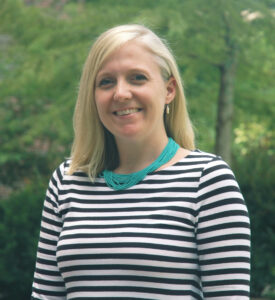Three University of Georgia Franklin College of Arts and Sciences faculty members were recognized with 2020 Faculty Early Career Development (CAREER) Awards from the National Science Foundation: assistant professor Rachel Roberts-Galbraith, associate professor Julie Stanton of the cellular biology department and assistant professor Jaewoo Lee of the computer science department.
The CAREER award offers the NSF’s most prestigious awards in support of early-career faculty who exemplify the role of teacher-scholars through outstanding research, excellent instruction and the integration of education and research within the context of the mission of their organizations.

Rachel Roberts-Galbraith
Rachel Roberts-Galbraith
Roberts-Galbraith’s research focuses on understanding animals that can regenerate missing tissues after injury. Her lab studies small flatworms called planarians that can regenerate their entire bodies after nearly any amputation or injury.
“The projects funded by the NSF CAREER Award will reveal how cells in the planarian body send and receive small signals to alert the animal’s body that an injury has occurred,” said Roberts-Galbraith. “We are interested in how these signals can relay information about what tissue is missing or how much tissue is missing, so that cells respond and repair the damage correctly.”
In addition to funding research activities, the NSF CAREER Award also supports an educational outreach component. Roberts-Galbraith collaborated with Amanda Frossard, assistant professor in the chemistry department, to develop a First-Year Odyssey Seminar to introduce new students to research experiences available on campus. In addition, her lab will welcome K-12 teachers from the Clarke County School District as summer scholars.
“This opportunity will support K-12 teachers that are continuing their education,” said Roberts-Galbraith. “We will work together to create lesson plans that introduce Clarke County students to planarians and regeneration.”
Roberts-Galbraith earned her Ph.D. from Vanderbilt University and worked as a postdoctoral fellow at the University of Illinois at Urbana-Champaign before coming to UGA.

Julie Stanton
Julie Stanton
Stanton and her lab study undergraduate metacognition development and methods to accelerate its growth. Metacognition is the awareness and understanding of one’s own thought processes. When students use metacognition, they can identify what they do and do not know and develop better study habits and techniques from that to become more effective, efficient learners.
“Metacognition is something students use when they are facing novel challenges,” said Stanton. “With the pandemic, we expect students to be using metacognition more to reflect and adjust how they are learning because of the difficult times. This is an interesting time to be studying this subject.”
Stanton will launch a longitudinal study at three universities in Georgia: UGA, the University of North Georgia and South Georgia State College. The study will follow students throughout their collegiate career to gather data on the trajectory of developing metacognitive skills.
Stanton will also investigate social metacognition. As students are encouraged to study independently and in small groups, these groups can help each other develop metacognition. Stanton will work to identify what types of statements or questions the students are asking each other to stimulate metacognitive learning.
“It is hard to learn these new skills,” said Stanton. “Students have to be given examples that apply to subjects they are currently learning and taught how to practice metacognition.”
The foundational knowledge from these studies will help create an evidence based course for first-year students called “Metacognition and Biology.” After revisions, the course will become a permanent part of the Division of Academic Enhancements program. To help with teaching metacognitive practices, Stanton will develop an online workshop that will be shared on a national network to help faculty implement metacognitive exercises in their classrooms to give students practice.
Stanton earned her Ph.D. at UGA before a postdoctoral position and a clinical assistant professorship, both at Washington State University.

Jaewoo Lee
Jaewoo Lee
With ever-increasing application of machine learning techniques in sensitive application domains such as health care, financial services and national security, privacy concerns continue to grow. This has led to a growing interest in the development of privacy-preserving machine learning algorithms.
“Despite recent advances in privacy-preserving machine learning techniques, in practice we still see less adoption of those techniques due to the concerns about their performance,” said Lee. “The goal of this project is to establish firm theoretical foundations and to develop tools and algorithms for building machine learning models while protecting the privacy of individuals in the training dataset.”
As part of his educational outreach efforts, Lee will provide summer internships to local high school students to enhance student engagement in advanced, cyber problem-solving techniques.
“I am collaborating with the computer science department and UGA’s Center for Continuing Education and Hotel to organize a three-day summer camp on machine learning and artificial intelligence,” said Lee.
Lee earned his Ph.D. in computer science from Purdue University. He spent two years at Penn State as a postdoctoral research associate before coming to UGA.







